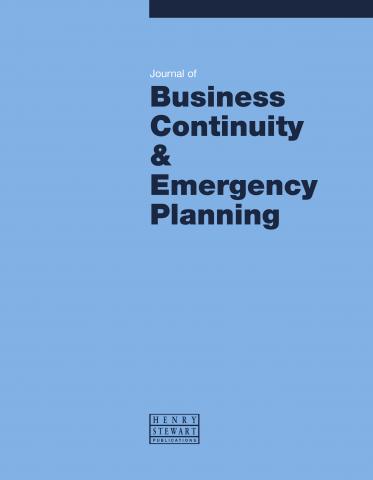"Journal of Payments Strategy and Systems provides a host of useful, actionable and informative articles and papers that demonstrate the extraordinary opportunities for improving the payments systems. These are written by subject matter experts: corporate practitioners; consultants; bankers; vendors and scholars. The variety of the topics and the points of view make this a must read, even for those who think they know all there is to know about payments."
Academic continuity planning in higher education
Click the button below to download the full text of the article.
Abstract: Crisis planning in institutions of higher learning has focused largely on emergency management, physical safety and technology recovery. While these are clearly important, many aspects of planning for continuity have largely been ignored, including planning for the post-secondary education sector’s core business, that is, the delivery of graduate and undergraduate academic programmes. Use of the term ‘academic continuity’ as a component of institutional planning is relatively new in higher education. Discussions on academic continuity have often centred on the use of technology-enhanced education and online teaching in the event of crisis or disaster affecting campuses. However, online approaches are only one aspect of academic continuity planning. Using examples of two different crisis situations encountered at a large urban university spanning three campuses, this paper presents an approach to academic continuity planning that can potentially serve as a model for other institutions.
Keywords: academic continuity, academic disruption, pandemic, higher education
Cheryl Regehr Vice-President and Provost of the University of Toronto. She is a professor in the Faculty of Social Work, with cross appointments to the Faculty of Law and the Institute of Medical Science at the University of Toronto, and a Senior Fellow of Massey College. Her previous roles include Dean of the Factor-Inwentash Faculty of Social Work and Director of the Pearson International Airport Crisis Response Team. She also served on the mental health advisory committee for the Department of National Defence and Veteran’s Affairs Canada. She has written four books and over 120 scholarly articles on trauma and recovery; practice competency; and stress, trauma and decision-making in emergency service professions.
Sioban Nelson is Vice-Provost, Academic Programs and Vice-Provost, Faculty & Academic Life at the University Toronto. She is a professor in the Faculty of Nursing, a fellow of the Canadian Academy of Health Sciences, and a fellow of the American Academy of Nurses. Her work in the fields of nursing and health history and contemporary practice and policy has been published in three monographs and six edited collections. She also Co-Editor of the Culture and Politics of Healthcare Work series published by Cornell University Press. Her research interests include labour mobility and the global health workforce, and health professional regulation and transnational history.
Angela Hildyard is currently Special Advisor to the President and Provost at the University of Toronto. She was Vice-President, Human Resources and Equity at the university from 2001 to 2016, making her the longest serving vice-president in the institution’s history. Her previous positions include Dean of the Ontario Institute for Studies in Education and Principal of Woodsworth College. As Professor of Higher Education at the Ontario Institute for Studies in Education, she continues to teach graduate courses and supervise doctoral students. She is President of the Senior Women Academic Administrators of Canada.



